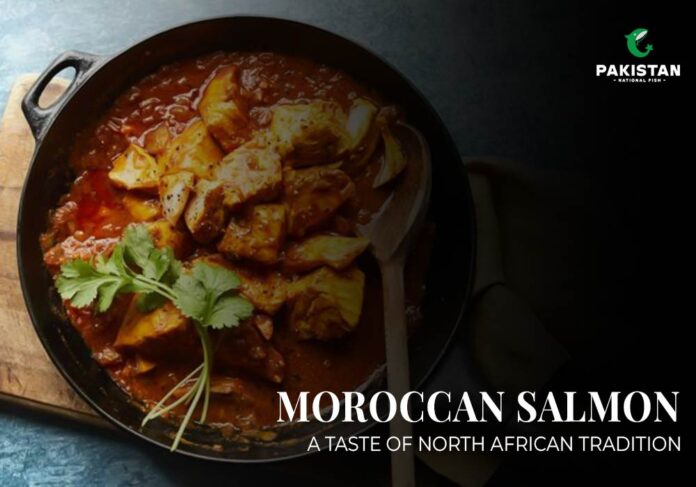The recipes of Moroccan cuisine pay attention to the presentation and use of bright colors in food preparation, as well as to the form a dish grabs from the interrelation of different cultures and their contribution to the preparation of specific meals.
Salmon although is not an original Moroccan fish can be found on Moroccan tables seasoned and flavored in the traditional Moroccan manner. Moroccan salmon is also not just an ordinary dish one can prepare and eat but it’s a discovery that is associated with Moroccan traditions and passion for zest.
Why Salmon Is Great For Moroccan Cooking
Salmon, high in omega-3 fatty acids, pairs well with Moroccan spices and flavors. It retains moisture and is a good source of omega-3, reducing omega-6 fatty acids and improving health standards. Salmon is generally rubbed with a marinade consisting of olive oil, garlic, lemon juice, and combined spices for Moroccan cuisine including; cumin, paprika, coriander, and ras el hanout.
Besides being an added source of aroma and spices, the marinade helps to keep the fish moist while reducing its cooking time and adding flavor to the fish.
Key Resources Needed When Cooking Moroccan
Ras el Hanout: Ras el hanout, a blend of Moroccan spices, is a key component in Moroccan cuisine, adding richness and substance to Moroccan salmon.
Preserved Lemons: This is olives’ counterpart in Moroccan cuisine and is made from fresh lemons stored in their juices and salt. It is however characterized by a natural ability to have a salty, tangy, and a bit of bitterness and these make the salmon dish to be very spectacular.
Harissa: Harissa is a spicy chili paste from North Africa and it adds that much-needed heat to the recipe. A little of this burnt red chili pepper paste, made from red chili peppers, garlic, olive oil, and spices including cumin and caraway is added to the marinade to provide heat.
Olives: Fish is usually complimented by green or black olives that give seafood dishes its briny and savory flavor. Choosing a lemonade to accompany these is a relatively easy task due to the richness of the taste of salmon and the sourness of preserved lemons.
Fresh Herbs: Coriander and parsley are used at the end of cooking Moroccan foods to enhance the freshness and also color. They also mitigate the thickness of fish and spices or rather tone down their flavors.
Olive Oil: Moroccan food makes use of olive oil in cooking and also uses it in the dressing of foods. It brings depth to the dish and allows the flavors of spices to be infused through the salmon.
Preparing Moroccan Salmon
Ingredients
4 salmon fillets (skinless and skin-on both are fine, according to your preference)
2 tablespoons ras el hanout [optional]
One tablespoon of harissa paste depending on how spicy one wanted it to be.
1 preserved lemon (rinsed and the pulpy flesh of the fruit removed ) and finely chopped.
2 cloves garlic, minced
2 tablespoons olive oil Juice of
1 lemon
1 teaspoon ground cumin
1 teaspoon ground coriander
1 teaspoon paprika
Salt and pepper to taste
Small green or black olives, a few rinsed and chopped (optional)
Finely chopped tender and fresh cilantro or parsley for garnish
Instruction:
- Marinate the Salmon: Put the ras el hanout, the harissa paste, the chopped preserved lemon, the garlic, the olive oil, the lemon juice and zest, the cumin, the coriander, the paprika, salt and black pepper in a bowl. Pat the mixture onto the salmon fillets so that the fillets don’t have a powdery layer and the spices stick well on them. Cook the salmon for not less than half an hour or up to 2 hours when placed in the refrigerator to enhance the absorption of the flavors in the fish.
- Cook the Salmon: In essence, there are different ways that you can be used to cook the salmon as per your desired method.
- Grilled: Cook salmon for about 4-5 minutes on each side over medium-high with a little char marks indicating the fish is done.
- Baked: You have to heat the oven to 400 degrees Fahrenheit, or 200 degrees Celsius. Put the salmon on a baking tray covered with parchment paper and bake for 12-15 minutes until it is easy to flake the salmon with a fork.
- Pan-Seared: Turn the stovetop on medium heat and melt one tablespoon of olive oil on the pan. Oil the salmon and grill for about 4-5 minutes on each side to get that crispy brown look.
- Garnish and Serve: After the salmon is done, add a dash of cilantro or parsley or chopped green onions and a few olives. It should be served with lemon wedges to enhance its flavor of sour fruits.
Side Dishes To Accompany Moroccan Salmon
Couscous: Couscous is a part of Moroccan food, and therefore complements Moroccan salmon perfectly well. Due to its tender and fine-grained texture that reminds the risotto but most, couscous cooked with saffron, almonds, and dried fruits looks very glossy in pairing with the spicy and succulent salmon.
Tagine Vegetables: Moroccan spices cooked with slow cookers carrots, squashes, zucchini, and tomatoes are a little-rich vegetable dish suitable to be served alongside the rich taste of the salmon.
Flatbread: Spanning the earth, Moroccan flatbread known as khobz is a basic, rough country bread that never fails for its absorbent quality; perfect here to lap up the treatment from the salmon.
Roasted Potatoes with Harissa: Potatoes can be roasted in the oven and spiced with harissa and olive oil and become a crispy outlook to the food.
Moroccan Salad: Tomatoes, cucumbers, and red onions served with a quick olive oil and lemon juice dressing make a light salad that contrasts the richness of the salmon. Moroccan Salmon.


